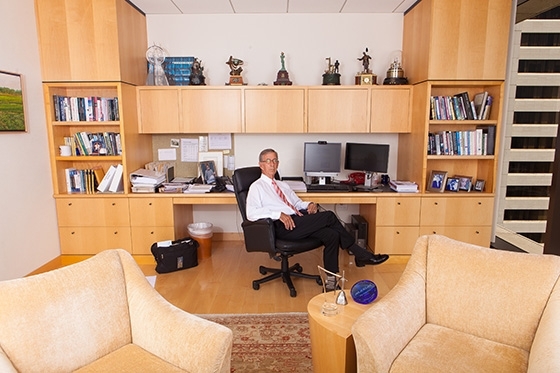Kip Hagopian learned the value of hard work at an early age. From the time he was about ten years old, he spent summers working on his uncle Soak’s farm near Fresno, California, where Soak’s parents settled after emigrating from Western Armenia in the Ottoman Empire at the turn of the century.



“I drove around with Soak as he tended the farm. He often had me doing manual labor: irrigating cotton and sugar beets and whatever other chores he tasked me with. By the time I was 12 I was driving a tractor, mowing and raking alfalfa. Sitting on a tractor all day is a tough job, but for a kid my age it was exhilarating. They didn't have any child labor laws in those days!” Hagopian says.
Soak farmed alfalfa to enrich the soil so he could eventually fulfill his dream of growing grapes. Years later, he became the biggest grape grower in California. When he died, in honor of his parents, he left his $15 million estate to a trust to provide college educations to all of his parents’ descendants.
Soak survived the Genocide thanks to his parents’ decision to leave Armenia.
At age 24, Hagopian’s grandfather Khachik led his wife Aghavni and their extended family and friends —30 people in all — hundreds of miles from their village to the Black sea, where they boarded a freighter bound for the United States. Their escape came after the murder of Khachik’s father and brother, and Agavni’s five brothers in the massacres that preceded the Armenian Genocide at the hands of the Ottoman authorities in 1915. “They all took a great risk going to Fresno,” Hagopian recalls. “By the time the family got there, they had no money. They spent the last of their money buying train tickets from Ellis Island to California.”
Hagopian’s father Ralph, Soak’s older brother, was as ambitious and entrepreneurial as Soak. He started driving a truck soon after high school, and after years of hard work he saved enough money to start his own trucking business with his wife Juanita as his sole salesperson. “When my father died in 1983, he left my mother $1.5 million, which was maybe the equivalent of $3 million today. Not bad for someone without an education who couldn’t speak English when he started kindergarten,” Hagopian believes.
Soak, Ralph and Juanita could not have given the young Hagopian a better start in life.
He has worked hard and prospered ever since, building a 30-year-long career in high-technology venture capital investment. Hagopian co-founded Brentwood Associates, a venture capital and private equity group which, with its various successor companies, still manages several billion dollars. Under Hagopian’s leadership, Brentwood was an early investor in Apple Computer and several other highly successful high-technology companies.

Hagopian has also ventured into film, forming Segue Productions Inc. in 1991, which developed and produced two films. He was an executive producer of “Restoration,” featuring Robert Downey Jr., Meg Ryan and Hugh Grant. The film went on to win two Academy Awards. Hagopian was also one of the producers on “Ransom,” which starred Mel Gibson and grossed $350 million worldwide – approximately $600 million at today’s ticket prices.
During the early days of the dot-com boom, Hagopian co-founded and chaired the board of an Internet startup, which made him and the investors a considerable amount of money.

Hagopian’s interest in his Armenian heritage and his success in business have led him to look into Armenia’s economy. “Armenia is a struggling state with only sporadic growth,” he frowns. “Its GDP per capita is very low at $6,200, about one-eighth of that of the United States. A big part of the problem is that the country scores so low on the economic freedom indices, which usually means excessive regulation. If Armenia doesn’t have a true free market economy, how could it possibly prosper?” he asks.
“Too many young Armenians have voted with their feet and left the country. The current population is only three million, compared to eight million in the diaspora. This needs to be reversed if the country is to prosper.”

Hagopian believes Armenians are innately talented.
“We are very industrious people; we share a spirit of hard work and entrepreneurship; and we are self-reliant and resilient. Maybe it comes from our history. We feel like we’re all alone in this world and we have to make it on our own. We don't want to rely on anybody.”
Would he consider lending his business expertise to help the Armenian government? After all, he is semi-retired now and has some extra time on his hands. He smiles. “No. Real economists are what they need. There are lots of great economists out there, and I know some of them, so I might be able to help. But I wouldn't be the right person. You have to know your limitations.”
The story is verified by the 100 LIVES Research Team.




